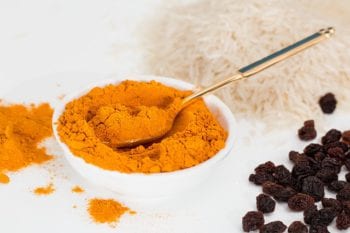If I could only choose one supplement to take for brain health, it would be turmeric with curcumin. Thankfully, I don’t have to choose just one. Turmeric is one of the best supplements for brain health. Turmeric has so many properties to help our brains but also helps many other aspects of health. And it’s so easy to incorporate into the diet. I’ve done some research based on medical findings and the results are astounding. Turmeric and brain health go hand in hand.
I’ll go over some specific ways that turmeric and curcumin (the effective part of turmeric) help our brains. Get ready to be amazed.

What is Turmeric?
Turmeric is a spice used in cooking and as a medicinal herb in India for thousands of years. More recently, it’s been used as a supplement in the western world. Science has been researching and finding it does contain compounds with medicinal properties (Gunnars, Healthline.com, 2018).
It is the root of a flowering plant in the ginger family, scientific name, Curcumin longa. Turmeric contains curcumin, which gives it its yellow color and has been shown to boost memory, stimulate the creation of new brain cells and slow down the development of Alzheimer’s. It’s best known for its use in curry and one of the spices used for making the beloved dill pickle. Curcumin is the active component that makes Turmeric great for the brain.
It’s best absorbed with black pepper because of its natural substance, piperine, which increases the absorption rate of curcumin by 2,000%. FYI, piperine is known under the trade name of Bioperine in supplements.
#1 in: The Top 10 Brain Supplements
Why Turmeric for the Brain?
Antioxidant Factors
Antioxidants help to neutralize free radicals in the body. Free radicals are molecules with unpaired electrons that can wreak havoc when they pair with other organic substances in the body. Curcumin acts as an antioxidant and also boosts the body’s antioxidant enzymes, according to Gunnars’ Healthline article. It neutralizes free radicals and provides a two-prong approach. Treat and prevent.
Anti-Inflammatory
Now we’re talking. This is where we’re talking more about the benefits of turmeric on the brain.
inflammation on its own is necessary to fight off foreign invaders in our bodies. It becomes a problem when it’s chronic and starts attacking our body’s tissues.
According to Gunnars (Healthline.com), low-level chronic inflammation plays a role in almost every chronic Western disease. Turmeric has such anti-inflammatory powers that it is as effective as some anti-inflammatory drugs, without the side effects.
Inflammation and oxidation damage are contributors to dementia and Alzheimer’s disease. It follows that it’s good for possible prevention and some even think it might slow down or reverse the progression of dementia and Alzheimer’s. Scientists need to perform more studies on the use of Turmeric and Curcumin for the treatment of dementia and Alzheimer’s before it can be truly confirmed.

Amyloid Plaque: A Big Problem
There is some biology in Alzheimer’s in which there are ‘protein tangles’ in the brain. These are a feature of Alzheimer’s and can start years before there are any symptoms of the disease. Studies show that curcumin can help clear these plaques as well as inflammation of brain cells.
Dr. Bu, one of the researchers at Mayo Clinic (2016) thinks that these amyloid plaques might be the cause of dementia and Alzheimer’s. He states that molecules called heparan sulfates form on brain cells. These are naturally occurring but if they accumulate or sort of ‘clog’, this is where the problems start. Now we are finding out there are multiple causes of Alzheimer’s and dementia. But the amyloid plaques are almost always present, in any case.
Since there are so many benefits to eating or taking Turmeric (aka Curcumin in the supplement world), it makes sense to add it to the diet or supplements. Turmeric and brain health go hand in hand.
Anti-Depressive Properties
Curcumin (the active ingredient in turmeric) is showing promise in treating depression, too.
A 60 person trial of people with depression was randomized into three groups. One group took only Prozac, another group only given one gram of curcumin and the third group both Prozac and curcumin.
After 6 weeks, the curcumin only group had similar results to those taking only Prozac. The group taking both had the best results. That’s impressive!
So according to this study, curcumin is as effective as an antidepressant. (Gunnars, 2018 [Healthline.com]).
If you’re on an antidepressant, check with your doctor before making any changes.
Check out these additional supplements for depression: Best Natural Treatments for Depression.
Turmeric, the Best Brain Food
Antioxidant, Anti-Inflammatory, anti-depressant, potential preventive and treatment for Alzheimer’s… I’m in.
I have to say I’ve been taking turmeric on and off for the past few years. Consequently, I do notice a big difference when using it. My brain is more alert and I feel more clear-headed. Now I don’t go a day without Turmeric/Curcumin.
If you don’t like taking pills, you can make tea out of it. Just heat water, open the capsules and empty right in! Voila! As an alternative, the recommendation is to take turmeric or curcumin as a supplement (capsule or tea), mainly because we just can’t get enough of the valuable curcumin from food alone.
I hope you enjoyed this article and can incorporate Turmeric and/or Curcumin into your supplement regimen. To your brain health!
If you have any comments, questions, or experience with Turmeric/Curcumin, please leave them in the Comments section below. I’ll be sure to respond ASAP.
Check out these supplements today! You may want to add Turmeric/Curcumin to your daily routine. What an easy way to help our brains.
Puritan’s Pride Turmeric Curcumin with Bioperine 1,000 mg-120 Capsules
References:
Gunnars, K. (2018) 10 Proven Health Benefits of Turmeric and Curcumin https://www.healthline.comhttps://www.healthline.com/nutrition/top-10-evidence-based-health-benefits-of-turmeric/nutrition/top-10-evidence-based-health-benefits-of-turmeric
Punsky, K. (2016). Mayo Clinic. https://newsnetwork.mayoclinic.org/discussion/mayo-clinic-researchers-find-way-to-prevent-accumulation-of-amyloid-plaque-a-hallmark-of-alzheimers-disease/
Zayed, A.(2019) Best brain Foods: 10 Foods for better Cognition, Focus, and Memory. https://www.consumerhealthdigest.com/brain-health/brain-foods.html
Get Updates!
Sign up for email notifications when there are new articles on MyWellBrain!





Hello Paula, I must say that this article is very helpful and informative. I heard so many benefits about turmeric but I did not know it has also a great effect on our brain. I did not use it because of its taste but from now on I will try to use it more often, thank you a lot for sharing, this is one natural food we should take advantage on.
Thank you for your comment Daniel. I’m glad you learned more about turmeric! I learned even more doing my research also.
Wow! I never new turmeric is also good for the brain. I usually incorporate turmeric powder in my food preparation. Sometimes, I also take the capsule and tea. I’m using it because it helps with my gout. Thank you for this article. I learned more about turmeric. All the best!
Thank you for your comment. Nice to know it helps with gout too! Must be that anti-inflammatory factor..To your health!
Nice to see this article, turmeric is great for you.
I’ve worked in the fitness world for a long time and recommended Curcumin as a supplement and cooking with turmeric for a long time.
About 5 years ago or so it got a little bit more popular as I remember more people asking about it when they had supplement questions.
It’s still one of those lesser known secrets and it’s good to see articles like this about it.
Thanks so much for commenting. It’s a great brain supplement for sure. I think it should be a foundation supplement for anyone working on their brain health. I appreciate you sharing your experience with it.
Thanks for such an informative post about turmeric!
Turmeric seems like a really wonderful medicinal herbs that had been underused. In fact, I have recently come across someone who uses turmeric as a pain reliever for her lupus (an autoimmune disease). There are so many benefits are we are not awared of.
That’s amazing, Grace, regarding taking it for lupus. I also believe everyone should be taking turmeric. As an antioxidant, it can help prevent chronic diseases and even cancer. Thanks for commenting. 🙂
I had heard that turmeric had beneficial qualities to it but I had no idea the extent of these! I am going to start adding turmeric to a lot of our meals. I enjoy the flavor that it adds anyways, so this will be a nice addition. I’ve been looking for anxiety relief and had no idea it was as simple as adding turmeric to my diet. Thank you so much for this information, it’s very helpful!
My pleasure, Travis. I appreciate your comments on several articles too. Your anxiety arsenal is growing. 🙂
Hi, I’m on various antidepressant medications for well depression and social anxiety. Assuming Tumeric and Curcumin are safe for me to take with my medications, do you think I should take both of them or just curcumin? I’m not sure exactly what I should do about starting out. Is there a Tumeric/curcumin product you can suggest for me? Thanks.
Curcumin is in Turmeric so it’s really just one thing. Curcumin is the active ingredient, it’s just some brands add extra Curcumin to it (which is fantastic). It’s just a spice and won’t affect your medication. I think you’ll see a difference. I do recommend this Puritans Pride Turmeric with extra Curcumin and black pepper. The black pepper helps to absorb it better. I’ve been taking it for a while and it makes a noticeable difference. 🙂
Hi, I am glad I discovered this article. I make a smoothie every morning filled with super foods. Such as fruits, chai seeds, almonds, pumpkin seeds, milk, vegan protein powder. I would like to add this to my daily habit and try it out. This is the first time I have heard about Turmeric. How much is needed to get a good serving of nutrients?
Good article. Thanks for that.
You’d probably need about a teaspoon to see any results. It has a strong flavor but it might hide nicely in a smoothie. 🙂 Supplements give optimal amounts. FYI. Thanks for reading and appreciate the feedback.
This herbal product widely spread in the Philippines at the turn of the 21st century. I thought it’s new but I learned from this post that it has been used a thousand years ago.
I’m curious about what it does for the brain. All that I know is that the brain cells can never be repaired by any substances and medicines once it is damaged. Interestingly, the turmeric has something to offer for the brain.
There’s one thing I noticed about this rhizome. I often time use this for spice for viand and as I cut it there is that substance that sticks to the knife and I’m thinking that would be bad for health since it sticks. This is only my wild idea but I don’t have any scientific basis.
The best specimen would be the people of India who have used it for a long time.
Thank you for this interesting post to learn from and ignites curiosity and poses a challenge for every one of us.
Turmeric helps to break up the ‘plaques’ that can build up in the brain (caused by inflammation and toxins). These are often found in Alzheimer’s and dementia patients. By the way, there are also nutrients like choline and magnesium that help protect the brain so it can actually repair. Turmeric helps the brain create new brain cells. Thank you for reading and your great questions.